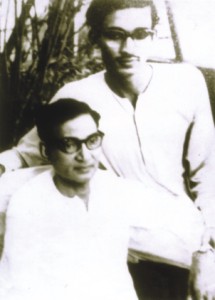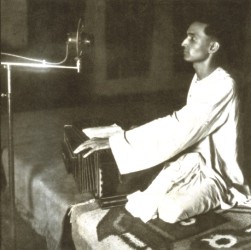 |
Mustafa Zaman Abbasi with his father Abbasuddin Ahmad. |
Tribute
My Father's
Last Dream
Mustafa Zaman Abbasi
Abbasuddin Ahmad, my father was an all time dreamer. As his birth anniversary falls on 27th October, I try to remember some of his last dreams on the occasion of his 107th birthday.
While unquestionably a pioneer in the field of music, he dreamt of being a writer too. Early in 1957 when symptoms of a deadly disease of progressive muscular atrophy were detected, he knew his days were numbered. He started writing in a blue diary in beautiful small letters, his autobiography which was published after his death in 1961 as Amar Shilpi Jibaner Kotha. After the book was published, Syed Mujtaba Ali, Munir Choudhury, Shamsur Rahman. Al Mahmud, Zia Hyder offered compliments to the singer-writer as a book not only as the story of a pioneer musician, but also a literary work of excellent quality. They said that it depicted the blossoming of the dreams of the Bengali nation for cultural emancipation of his people. Unfortunately, the book is a small one, as he was struck with the disease, which was to take him away within a short time. He died when he was barely 58.
Why did he dream of becoming a writer? What was the driving force that encouraged him to take the pen? He had been a good student from the early days of his studentship. Till the BA class, which he failed due to reasons known to his readers, he never stood second in his classes. His Bengali was of literary style with Sanskrit, as his second language. His first literary work entitled Mathar Kanta drew attention of literary circles in the 30s when published in ‘Shaugat’. He wrote letters to friends in his beautiful handwriting. The letters preserved by his friends could be compiled to make it a sought after account of his days.
My father thought that the songs he sang would be preserved by radio stations for a long time (which was not the case). He hoped that some of his best numbers would still be sung by artistes he would leave behind. He was certain about one thing i.e. the songs would ultimately be lost, but a book worth its name would still be somehow available for posterity.
He encouraged everyone to write, especially me from the day I started learning alphabets. Today when I read the life of Garcia Gabo, the Nobel laureate, I find reflections of the same story. Gabo said that he dreamt of becoming a writer from early days when he started learning stories from his grandmother at the age of six. Someday all those stories were to shape him up into a writer for whom the world was waiting. Later, after receiving the Nobel, when asked as to how he could assimilate history of his continent in such a natural flow through his winning novels, his reply was: Some one told me from the age of six that I must write. My whole life, every single moment I desired to write, I desired to frame my characters, I desired to remember the dialogues of every single person of interest whom I met. I could virtually see them in front; the entire Latin America and their people in front of me.
My father, as I said, was a dreamer. In Calcutta, a student of class II, when I composed my first poem, nothing extraordinary, just two rhyming lines. He called his friend, the renowned poet Ghulam Mustafa, who would show equal bemused feeling and encouragement to me to be a poet in my time. He presented me with a beautiful notebook writing on it: Habu Kabi Mustafa Zaman Ke to compose poems. I remember one of my lines as under:
Library tibrary bhenge koro churmar
Ghulam Mustafa keno bhot chai barbar
(the poet was probably contesting an election somewhere, which I did not approve of ).
 |
| The legendary Abbasuddin rendering a song. |
Overnight, I composed seven and the next day when asked to read them out, both my father and the poet burst into laughter. The poems must have been a hilarious presentation of daily life. One of the poems was ‘Pakistaner Abhab Ki’. The poet asked whether he could borrow this line from me for writing his own song of the same caption. I agreed.
Again, when I was a student of class six at St. Gregory's in Dhaka. I managed to write my first drama (never published). It was about two friends disagreeing all the time until they found a way to coexist. My father took my small exercise book which was a bound school work book and read it with great interest. He showed it to his good friend, M. A. Azam, at that time the Director of Industries who used to visit us at our Patla Khan Lane residence. He was quite impressed! This encouraged the latter to write a book of his own, This Century and after.
Coming back to Gabo Garcia, and going through his famous novels, I could see how a writer would be read and re read for centuries. Gabo informs us in one of his interviews that throughout history writers are real dreamers and ultimate leaders of mankind.
Last month a compilation of two of my father's books Dino Lipi O Amar Shilpi Jiboner Katha has been published by Prathoma Prakashon. The neatly published volume not only brings home the stories of his life, but also shows his last dream fulfilled. The book is one of the core books to remain with the people of Bengal for all time to come.
*************************
Now I write a few lines for my friends of new generation. It may be regarded as a refreshers course for writers, as to how to sustain the dream to be writers.
Tagore produced his best between the ages of 70 and 80. Friends belonging to this category have every reason to rejoice as this is the ripe time to write. His best romantic novel Shesher Kabita was written, when Tagore was 70.
Shirshendu Mukherjee, arguably the best novelist of our time, celebrates the 74th spring of his life next year, in October 2010. He told me: this is the best time to write. You possess a wonderful pen. Do use it.
Probably the best romantic novel of Syed Mujtaba Ali, Shabnam was written when he was reaching 70. Again, I could give hundreds of stories when writers completed their best before they reached thirty.
Gabriel Garcia Marquez is the world's best story teller today. Born in 1927 (only ten years before me) he believed that a writer needs a man behind, a man touched by magic. Unless he is touched in this way, it will not click. GGM or Gabo, as known worldwide, was a magician as he wanted to be always. He said, 'writing books is a suicidal profession. No other demands as much time, as much work, as much dedication by comparison with its immediate benefit'. He further says, 'why does a writer write? The reply is a black or a Jew. Success is encouraging no doubt. The favour of one's reader is stimulating. One reader may be enough. Good writers will write even if shis books do not sell'.
Has God ever spoken to you? He might have. Or he would, someday. A writer is someone who is God's pick. The best writers of Bengali literature with whom I have my childhood friendship, are products of Gods intimacy in one way or the other. It may be worthwhile to have a connection with the Supreme, which has all the magical winds and wands at his command. The hero of world's number 1, i.e. young Harry Potter has a magic wand with which he travels to the fancy kingdom of worlds, young and old. Walt Disney had a magic wand too with which he mesmerized worlds young and old in Disneyland and Disneyworld. When I read Probodh Kumar Shannyal’s famous maha prasthaner pathey, I travelled with him as he had the capacity to take us along with him. He had his magic wand too, the story, the kingdom of Hindu Gods, belief and unbelief, romance and above all his literary style.
A writer needs an observation which others would not have. For instance, he may look at ants or a bird or a cat and would not know what the poor fellow is thinking about him. He must be an ant, a bird or a cat inside. The feeling of animal and plant life works as magic inside a writer. Visiting a zoo, a child easily picks up a conversation with a monkey or a lion or an elephant. Why can't we? The story of clouds made Kalidas write his Meghdoot. In those days there were no helicopters or flying clubs of small planes. When we read today we are astonished to find his feelings so accurate. Kalidas had the inner eye. All are imaginations no doubt, but has to be true to the origin.
Bengali as a language has a unique position in the world today. A thousand poets, philosophers, novelists, essayists, historians, shorts story writers, travel writers, gave us this honour out of which at least a hundred must be of world standard. It's a pity that our writers did not so far look beyond. The way to Nobel and other prizes are open. Indian, Pakistani, Japanese, Turkish, Iranian, Egyptian writers are receiving today's laurels. Why not we? Why is not the new generation looking for new vistas? Why is not the whole world in our vision?
******************************************
My father had three dreams, to see his eldest son be a successful barrister, his daughter a musician of eminence and great quality and his other son to be a singer-writer of quality too. His dreams for the first two are granted, the third one is unsure. I am working hard.
Copyright
(R) thedailystar.net 2009 |
